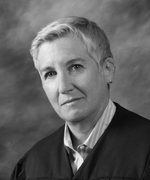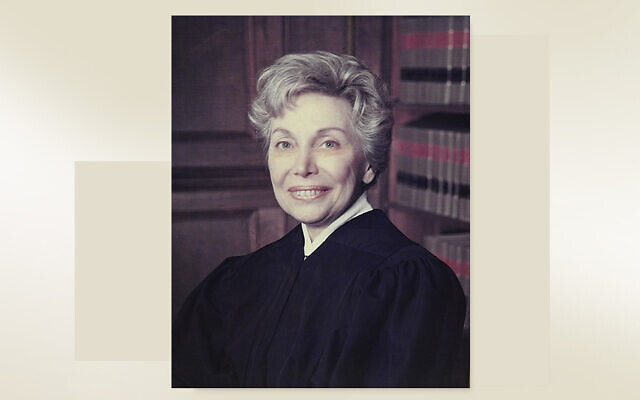UGA Scholarship Honors Jewish Jurist
Established by over 40 of her former clerks, the first Phyllis Kravitch scholarship will be awarded by UGA's School of Law this fall.
Phyllis A. Kravitch was never one to back down from a challenge. She began practicing law in 1944, almost 10 years before women were allowed to serve on juries in the state of Georgia. She was also the third woman in the nation appointed to a circuit court seat. Now over 40 of her former clerks are establishing a scholarship in her name at the University of Georgia’s School of Law.
“The operative word that I would use to describe Judge Kravitch is trailblazer,” UGA law school Dean Bo Rutledge said. “From the very moment that she graduated from law school and set foot in a Savannah courtroom with her father she was fearless. She was undaunted, and she was never afraid to break the next glass ceiling.”
While Kravitch died in 2017, her legacy lives on in those who learned from her, according to Rutledge, who saw firsthand the impact she had on his students.
“As the dean of the law school and a professor of students who have themselves gone on to clerk for her, those experiences, whether the cases that they were working on or simply the exposure to someone of her accomplishment, exert a powerful, inspiring influence in the life of a young lawyer or a new law student,” he said.
Two of her former clerks, Justice Therese M. Stewart of California’s First Appellate District and Jason Alloy, a partner at Atlanta’s Robbins Ross Alloy Belinfante Littlefield LLC, spoke to the AJT about Kravitch’s impact on their then-young careers.
Stewart’s clerkship was still relatively early in the judge’s time on the circuit court, in 1981.
“When I was applying for clerkships, there were very few women on the federal bench,” Stewart said. “I wasn’t only applying to women, and a professor of mine who knew that I was particularly interested in working for a woman, … called me and said she was looking for a woman clerk. I later learned that Judge Kravitch would often hold open a spot to see if she got qualified women applicants.”

Stewart made the journey from California — where she’d grown up and attended law school — to clerk for Kravitch in Savannah.
“She had really wanted to work with a firm after school but there weren’t any that were going to hire a woman, so she worked with her father.” Stewart said of Kravitch. “When she ran for the trial court, her two opponents dismissed her and did a lot of mudslinging at each other and she stood out, above the fray.”
Stewart explained that Kravitch’s practice with her father gave her experience working with the African American community, who supported her in that election.
“She had a history, both as a woman who had been overlooked and marginalized because of her gender and for working in a pretty segregated area for people who were being mistreated – not to mention the fact that she was Jewish,” Stewart said. “When President [Jimmy] Carter was looking for qualified women to put on the bench, she stood out.”
Stewart also reminisced about the maternal way she looked after her clerks, particularly the young women. “It was incredibly charming and infuriating at the same time,” she said.
Alloy, who clerked for Kravitch in 2003, shared his first impressions of her.

“She was already in her 80s, but was so sharp,” he said. “You couldn’t get anything by her; she was meticulous and paid very close attention to following the law, even if it led to an outcome she might not personally favor.”
He added that his limited time clerking for her sticks with him today.
“I think that what you learn in one year clerking for a judge like Judge Kravitch might be worth more than years of practice experience; it really is something that practice may never be able to replicate,” he said.
Alloy, himself a graduate of UGA law school, believed that the scholarship is the kind of legacy of which Kravitch would approve.
“She’s from Georgia and grew up here and practiced law here,” he said. “She unquestionably had a large impact on the state as a lawyer and a judge, and having a scholarship at the state university’s law school, giving future students the chance to attend in her name, is something that I think is a great way to honor her.”
Rutledge explained that the scholarship was fully endowed, and thus a permanent fixture at UGA’s law school, noting that he hoped it would foster a sense of community and carry on her legacy through its recipients.
“Over time we will build a cohort of Kravitch scholars who, much like the clerks themselves, will be bonded by being beneficiaries of her legacy,” he said. “If you are the Kravitch scholar at the law school this fall and spend three years learning about this individual, … you might want to become acquainted with the next Kravitch scholar.”
The first Kravitch scholarship will be awarded in the fall of 2020.




comments